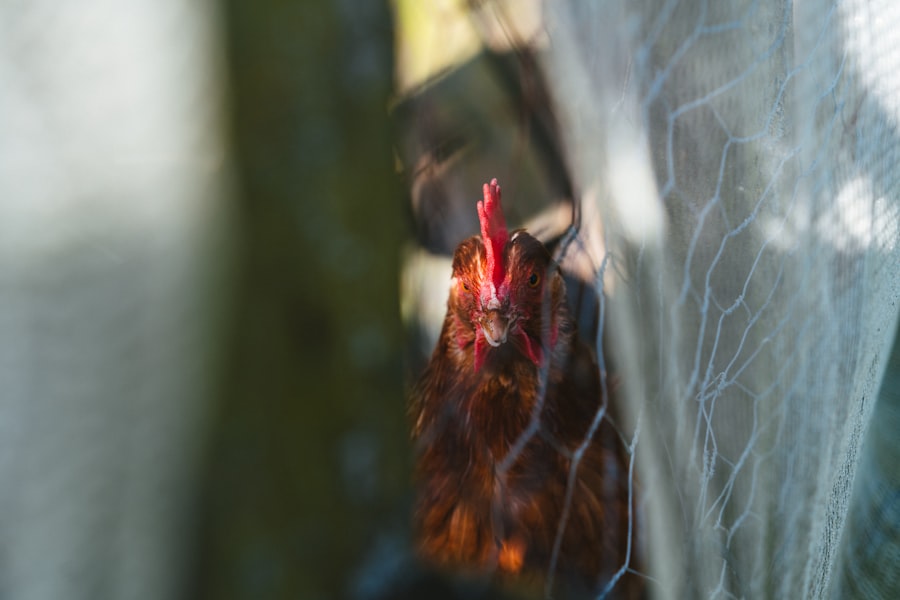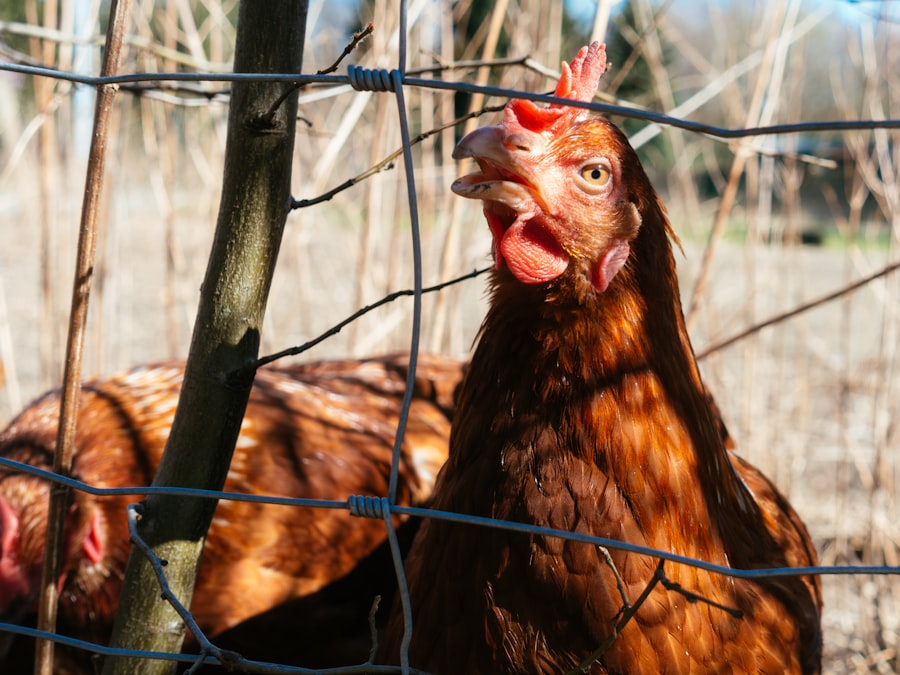Chickens are inherently inquisitive and gregarious animals that naturally forage for sustenance and investigate their environment. They are also known for their easily startled nature and tendency to be wary of unfamiliar stimuli. Comprehending these behavioral traits is essential when developing strategies to prevent chickens from accessing deck areas.
By recognizing their innate tendencies, one can more effectively anticipate their movements and implement proactive measures to discourage them from entering the deck space. Furthermore, it is crucial to consider the social hierarchy within a chicken flock. Chickens maintain a structured pecking order, with dominant individuals exerting authority over subordinate members.
This hierarchical system results in varying levels of boldness and assertiveness among flock members, with some chickens displaying more adventurous behavior while others exhibit greater caution and follow the lead of their more dominant counterparts. Understanding this social dynamic allows for the development of tailored deterrent strategies that account for individual chicken personalities and behaviors within the flock context.
Table of Contents
- 1 Implementing physical barriers
- 2 Using deterrents and repellents
- 3 Providing alternative areas for chickens to roam
- 4 Keeping food sources and attractants away from the deck
- 5 Training and conditioning the chickens
- 6 Seeking professional help if necessary
- 7 FAQs
- 7.1 What are some effective ways to keep chickens off your deck?
- 7.2 Why is it important to keep chickens off your deck?
- 7.3 Are there any natural deterrents that can be used to keep chickens off the deck?
- 7.4 How can I train my chickens to stay off the deck?
- 7.5 What are some potential risks of having chickens on the deck?
Key Takeaways
- Chickens are naturally curious and will explore their surroundings, including decks and patios.
- Physical barriers such as fences and netting can prevent chickens from accessing certain areas.
- Deterrents like motion-activated sprinklers or repellents like citrus peels can discourage chickens from coming near the deck.
- Providing alternative areas for chickens to roam, such as a designated free-range area, can redirect their attention away from the deck.
- Keeping food sources and attractants away from the deck can help reduce the likelihood of chickens congregating in that area.
- Training and conditioning techniques can be used to teach chickens to avoid certain areas.
- Seeking professional help from a veterinarian or animal behaviorist may be necessary for persistent chicken behavior issues.
Implementing physical barriers
Installing Fencing and Chicken Wire
One effective way to prevent chickens from accessing your deck is by implementing physical barriers. This can include installing fencing around the perimeter of your deck or using chicken wire to block off any potential entry points. It’s important to ensure that the barriers are secure and properly installed to prevent chickens from finding a way to bypass them.
Considering Height and Additional Options
Additionally, consider the height of the barriers, as chickens are capable of flying short distances and may attempt to hop over low fences. Another physical barrier option is to use motion-activated sprinklers or noise devices. These can startle chickens when they approach the deck, deterring them from coming too close.
Creating a Negative Association
The sudden burst of water or loud noise can create a negative association with the deck area, causing the chickens to avoid it in the future. By implementing these physical barriers, you can effectively create a boundary that discourages chickens from accessing your deck.
Using deterrents and repellents

In addition to physical barriers, there are various deterrents and repellents that can be used to discourage chickens from venturing onto your deck. One common method is to use natural scents that chickens find unpleasant, such as citrus or vinegar. By spraying these scents around the perimeter of the deck or using them in a diffuser, you can create an environment that chickens are less inclined to approach.
Another option is to use commercial repellent products specifically designed for deterring chickens. These products often contain natural ingredients that are safe for both chickens and the environment, making them a practical choice for keeping chickens away from your deck. Additionally, some repellents utilize ultrasonic sound waves that are undetectable to humans but irritating to chickens, effectively discouraging them from lingering in the area.
Providing alternative areas for chickens to roam
One way to prevent chickens from accessing your deck is by providing alternative areas for them to roam and explore. By creating designated spaces for chickens to forage and engage in natural behaviors, you can redirect their attention away from the deck area. This can include setting up a designated feeding area with a variety of treats and scratch grains, as well as providing enrichment activities such as hanging toys or perches for them to climb on.
Another option is to create a designated dust bathing area for chickens, as this is a natural behavior that they enjoy. By providing a dedicated space for dust bathing, you can encourage chickens to spend their time in this area rather than venturing onto your deck. Additionally, consider creating shaded areas with vegetation or structures that provide cover and shelter for the chickens, giving them a comfortable space to relax and socialize.
Keeping food sources and attractants away from the deck
Chickens are naturally drawn to food sources and attractants, so it’s important to keep these items away from the deck area to prevent them from being lured in. This includes securing garbage cans with tight-fitting lids to prevent chickens from rummaging through them for scraps. Additionally, be mindful of any bird feeders or pet food that may be left out on the deck, as these can attract chickens looking for an easy meal.
Another consideration is to keep any compost piles or food scraps away from the deck, as these can also be tempting for chickens. By properly managing food sources and attractants, you can reduce the likelihood of chickens being drawn to the deck area in search of food. This proactive approach can help minimize the presence of chickens around your deck and discourage them from attempting to access it.
Training and conditioning the chickens

Positive Reinforcement Techniques
In some cases, it is possible to train and condition chickens to avoid certain areas, such as your deck, using positive reinforcement techniques. This can be achieved by rewarding chickens for staying within designated areas and avoiding the deck. For example, you can use treats or mealworms to encourage chickens to stay within their designated roaming areas, reinforcing the behavior you want to see.
Aversive Conditioning Methods
Another approach is to use aversive conditioning methods, such as using a gentle spray of water when chickens approach the deck. This creates a negative association with the deck area, discouraging them from returning in the future.
Effective Communication of Boundaries
By consistently applying these training and conditioning techniques, you can effectively communicate boundaries to the chickens and encourage them to respect the designated areas where they are allowed to roam.
Seeking professional help if necessary
If you find that despite your best efforts, you are still struggling to keep chickens away from your deck, it may be time to seek professional help. A local animal control agency or pest control service may be able to provide additional guidance and support in addressing the issue. They can offer expert advice on effective deterrents and repellents, as well as provide assistance in implementing physical barriers that are tailored to your specific situation.
Additionally, consulting with a professional animal behaviorist or poultry expert can provide valuable insights into understanding chicken behavior and developing effective strategies for deterring them from accessing your deck. These experts can offer personalized recommendations based on the unique dynamics of your chicken flock and help you implement targeted solutions that address the root cause of the issue. In conclusion, preventing chickens from accessing your deck requires a combination of understanding their behavior, implementing physical barriers, using deterrents and repellents, providing alternative areas for them to roam, keeping food sources and attractants away from the deck, training and conditioning the chickens, and seeking professional help if necessary.
By taking a proactive and comprehensive approach, you can effectively discourage chickens from venturing onto your deck and create a harmonious coexistence between your feathered friends and your outdoor living space.
If you’re looking for more tips on keeping chickens, you might be interested in this article on how to convert a shed into a chicken coop. It offers valuable insights on creating a safe and comfortable space for your chickens to roost and lay eggs.
FAQs
What are some effective ways to keep chickens off your deck?
Some effective ways to keep chickens off your deck include installing physical barriers such as fences or netting, using repellents such as citrus peels or vinegar, and training your chickens to stay away from the deck.
Why is it important to keep chickens off your deck?
It is important to keep chickens off your deck to prevent damage to the deck surface, furniture, and plants, as well as to maintain a clean and sanitary outdoor living space.
Are there any natural deterrents that can be used to keep chickens off the deck?
Yes, natural deterrents such as citrus peels, vinegar, or cayenne pepper can be effective in keeping chickens off the deck. These natural scents and tastes are unpleasant to chickens and can discourage them from venturing onto the deck.
How can I train my chickens to stay off the deck?
You can train your chickens to stay off the deck by using positive reinforcement, such as offering treats when they stay away from the deck, and negative reinforcement, such as using a gentle spray of water when they attempt to go onto the deck.
What are some potential risks of having chickens on the deck?
Having chickens on the deck can pose risks such as damage to the deck surface, furniture, and plants, as well as the potential for unsanitary conditions due to chicken droppings. Additionally, chickens may become a nuisance to people using the deck for relaxation or dining.
Meet Walter, the feathered-friend fanatic of Florida! Nestled in the sunshine state, Walter struts through life with his feathered companions, clucking his way to happiness. With a coop that’s fancier than a five-star hotel, he’s the Don Juan of the chicken world. When he’s not teaching his hens to do the cha-cha, you’ll find him in a heated debate with his prized rooster, Sir Clucks-a-Lot. Walter’s poultry passion is no yolk; he’s the sunny-side-up guy you never knew you needed in your flock of friends!







